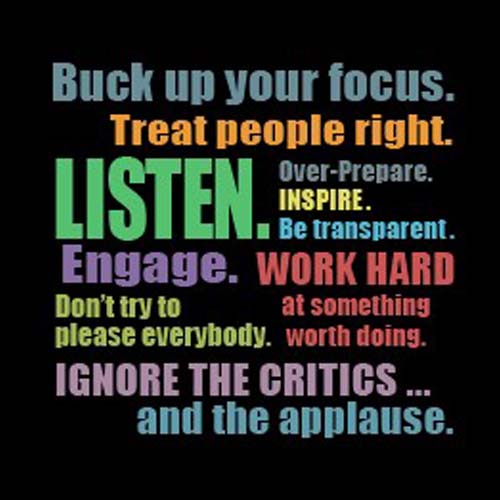I’ve always believed it’s important that those who have had a modicum of career success, regardless of the field, be there for the up-and-coming generation of wage earners, especially soon-to-be and recent college graduates. Providing counsel, being a reference, helping shore up a resume, looking over a cover letter — how many of us would have loved to have had a coach in that role during our formative employment years? If you were lucky enough to have had someone in that capacity — parent, counselor, teacher, coach … whoever — I’m confident that your own first uncertain steps were made from a more sure footing, with perhaps a smidgeon more confidence. If you’re truly blessed, those who assisted you are still in your life and always in your heart.
If you have an opportunity to talk to a greenhorn and are apprehensive about providing anything of value, you’re probably selling yourself short. But if you want a confidence booster, visit the googles — there are dozens of concrete thoughts on advice for college graduates that are worth reviewing before going into such a talk. One of the best is by Rebekah Barnett concerning direction “you wish you’d gotten when you graduated from college,” as answered by 25 TED speakers — visit here.
But I digress. Recently, I was given pause at the end of a casual conversation with a particularly articulate, inquisitive young soon-to-be graduate. After we talked basics (e.g., practice your interview skills, be patient, make and use connections, recognize that you don’t know what you don’t know), he tossed one out of left field to me, asking what would constitute, based on my nearly 40 years in the trenches, success in business and in one’s career?
Interesting question and I have to admit that I didn’t get a lot of wood on it that day. After a lifetime of working for various organizations and companies, I wasn’t necessarily stumped, but I also didn’t give him a succinct response because bunches of success criteria popped into my mind. I responded as best I could on the spur of the moment — he seemed satisfied — and then told him that I would give his excellent question some additional thought and get back to him.
Is Bottom Line Truly The Bottom Line?
As I reflected on the definition of business success, my gut told me that the answer couldn’t be as simple as consistently delivering a very high percentage of positive results to various stakeholder audiences — bosses, Boards, clients, donors, investors, staff. Such a track record of performance is doubtless an important (critical, even) measuring stick. Such achievements would include some combination of acceptable if not handsome bottom lines, plans and associated goals met, an elevation of organization respect, the assemblage of solid teams of great people, and other what I will refer to as unmistakable business measuring sticks.
As I noodled on this question, I couldn’t deny that I strived for those performance-oriented accomplishments. Delivering beyond expectations and being a business winner was essential to my family and me. My teams and I didn’t always succeed, but we set the bar high (or it was set high for us), and we went after it.
As I struggled to pen a follow-up note to the recent graduate, I couldn’t get out of my own head that I was off base. I couldn’t shake the feeling that I was disappointed in myself. After four decades, was business success, to me, solely measured by checking performance boxes? While acknowledging a propensity throughout a long career to be consumed with raising the bar and hitting marks, was that truly the assessment of business success that I wanted to pass on to this young man?
No. Not close. What jumped into my mind is that is only half of the success equation and not even the most crucial component.
Be The Light
Here is how I responded to this young man:
You asked me what would constitute success in business and in one’s career? The temptation is to point to bottom-line accomplishments, career advancements, upgrades in standards of living, and the like, and those are certainly all worthy goals. You should set the bar high and drive hard with an unbridled passion for your work. That being stated, recognize that those are not accurate evaluation metrics of business success. They are byproducts of the path you will forge throughout your career.
At the end of the day, folks are going to judge you as to whether you were a light that made vision possible.
Business success has the same definition of a life well-lived. If at the end of the day you have earned a level of respect — perhaps even admiration — for your good or valuable qualities; for how you didn’t compromise your integrity; for how you treated colleagues, communities and customers; and for your embrace of the importance of teamwork, you will have hit the business bullseye.
So then, one man’s definition?
Success means generating meaningful work, with conviction and integrity, that promotes inclusivity and community, being authentic, lifting up others, pushing boundaries, valuing differences, never compromising quality, making meaningful and lasting relationships (and hopefully even lifetime friendships) with people who are also authentic, and leaving the workplace and the world a better place.
To me, that prescription, at the end of a day, a week, a month, a year or a lifetime, constitutes business success.
Go get’em, my young friend.


